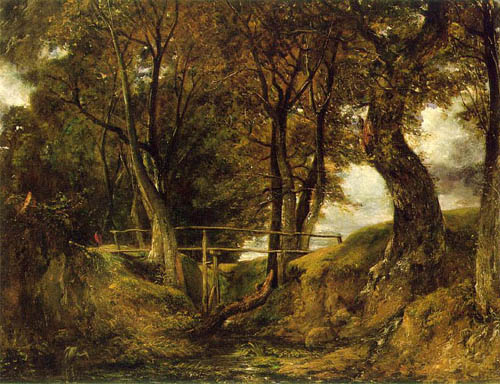 British
Poetry of the Romantic Period
British
Poetry of the Romantic Period British
Poetry of the Romantic Period
British
Poetry of the Romantic Period
English 4/802
Fall 2004
Stephen C.
Behrendt
319 Andrews; 472-1806
office: 2-4 R, and by
appointment
John Constable. Helmingham Dell. 1825-26.
Course Information
British Poetry of the Romantic Period
The poetry of the English Romantic period involved more than just five (or six) canonical male poets; the period saw the publication of literally thousands of volumes of poetry, by women and men alike. Often these poets knew one another's work (many knew one another personally as well), and so the poems of this period frequently engage in complex intertextual conversations, conversations in which the readers themselves were often very knowledgeable participants. Revisionist studies of English Romanticism in the last decade have resulted in a dramatically altered picture of the Romantic period and of its poetry.
This course aims, therefore, to acquaint you with the work of selected British poets of the Romantic period and with the historical, political, cultural, aesthetic, and intellectual milieu which they both reflect and helped to shape. It aims, further, to offer opportunities for all of you to discuss, and to think and write about, this poetry, its authors, its aspirations, and its ideological implications within a variety of historical and critical contexts. The larger objective is thus to help each of you to become a better, more informed, and more articulate reader and critic of Romantic texts in particular, and of cultural phenomena generally.
Even the definition of a Romantic "period" has become an issue in recent years, and some 18th-century scholars have even suggested that the era be added to what then becomes "the long eighteenth century." Others, working from the other end of the timeline, have suggested that in many respects the Victorian era begins not with Victoria's coronation in 1837 but rather with the accession of her uncle (the Prince of Wales) to the position of Prince Regent in 1811. Among Romanticists, the counter-argument to both these propositions is that the Romantic era is a time of volatility and change whose roots lie with the birth of Charlotte Turner Smith in 1749 and whose terminus coincides with the death of William Wordsworth in 1850. Probably a reasonable compromise involves at least tentatively identifying the "Romantic period" in Great Britain with the period extending from about 1775 to about 1835, or some sixty years. Elements of what we think of as Romanticism appear both before and after those dates, of course, just as elements of both Enlightenment and Victorian ideology are to be found throughout these sixty years.
We will read widely among a constellation of the working poets of the period. Our reading includes both historically canonized poets and poets whose lives and works have historically been neglected or marginalized but whose poetry is coming to be recognized as very much a part of the overall Romantic literary landscape, a landscape that is being continually remapped and revised in light of ongoing textual, historical, biographical, and theoretical scholarship in Romanticism. Part of this new scholarship involves a burgeoning activity in the production, dissemination, and study of electronic texts of original volumes that are often very rare and therefore inaccessible to most students and scholars. As part of our work in this course, we will examine some of these resources, and each of you will undertake a major research project that involves the recovery and reassessment of one volume of poetry from the period. The results of these projects will be posted, at the end of the course, on the website I maintain here and which is devoted to Studies in Romanticism at the University of Nebraska.
Course Requirements
Questions, comments, etc.
Please feel free to chat with me at any time about anything having to do with this course, or with your program of studies generally. I will be happy to help in any way I can, within reason. I will maintain my announced office hours; if something prevents me from doing so, I will post a note of explanation at my office. If my formal office hours do not work for you, we can usually make an appointment at some mutually convenient time, since I am on campus a good deal every week.